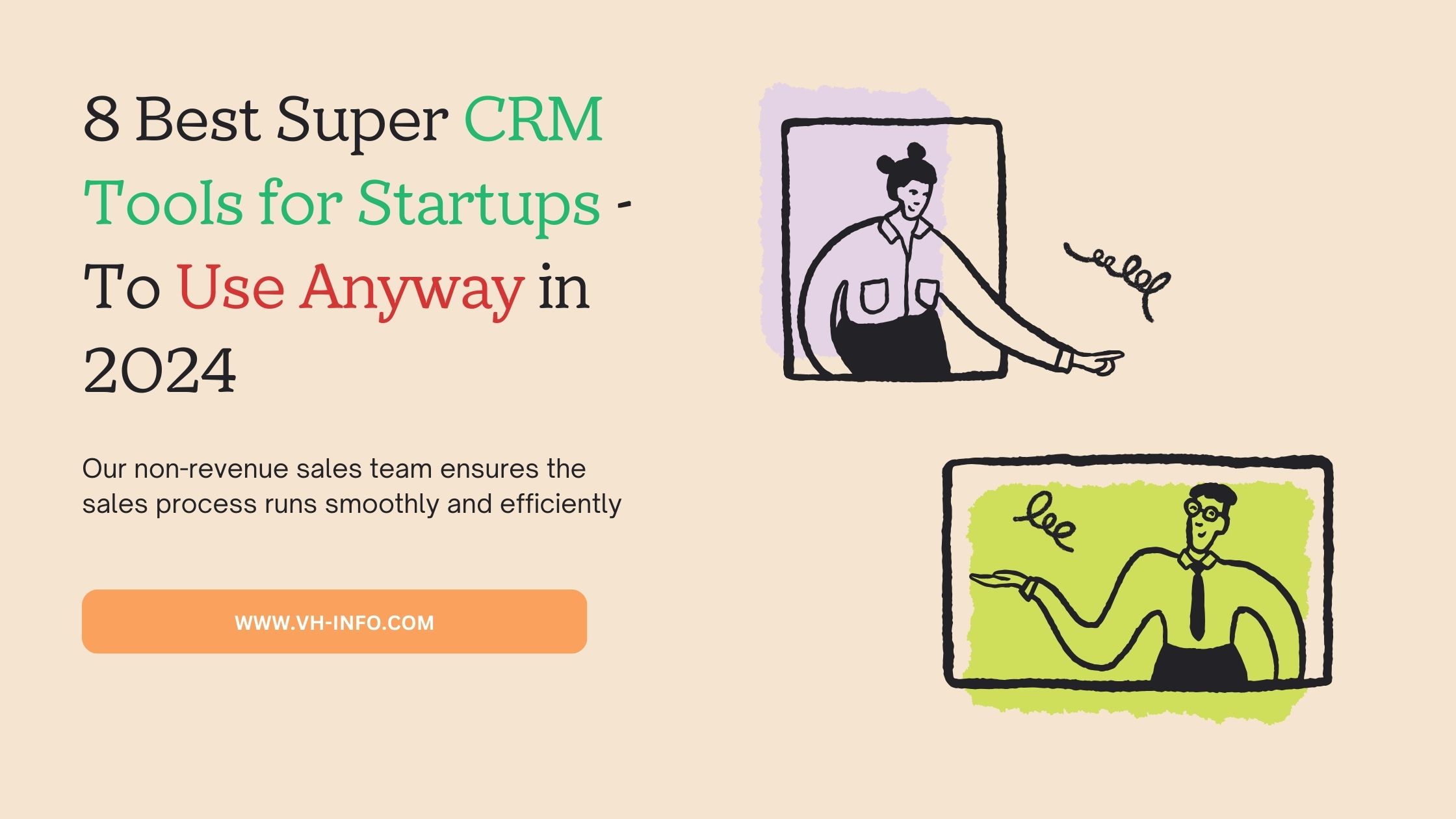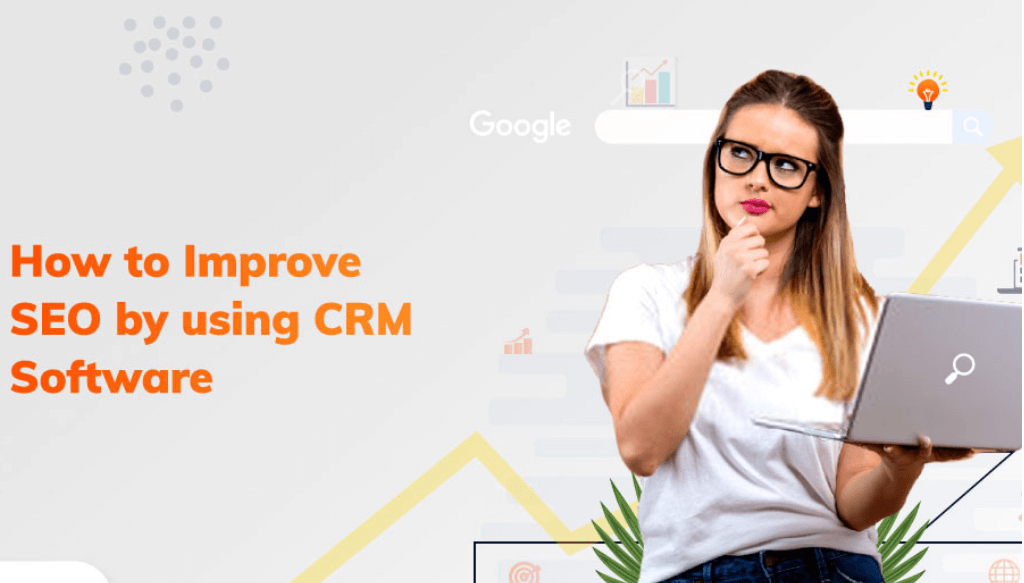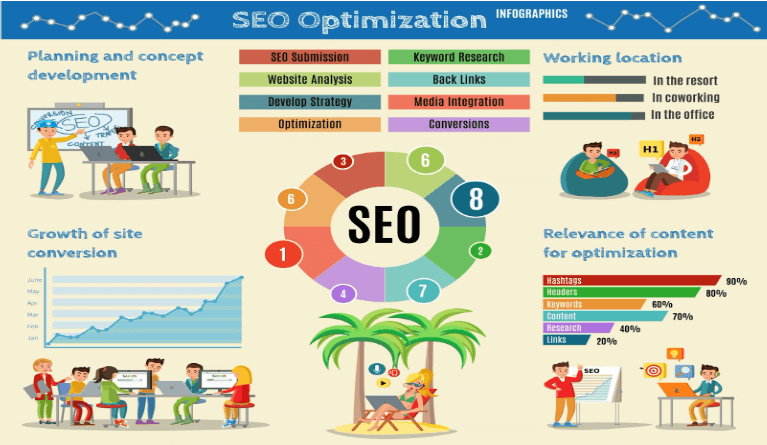What is CRM for a Startup?
For a startup, a CRM (Customer Relationship Management) system is a digital toolbox that centralizes all your interactions and data related to your customers and potential customers. It’s essentially a command center for nurturing leads, managing sales opportunities, and providing stellar customer service.
Why do you need CRM for Startup Business?
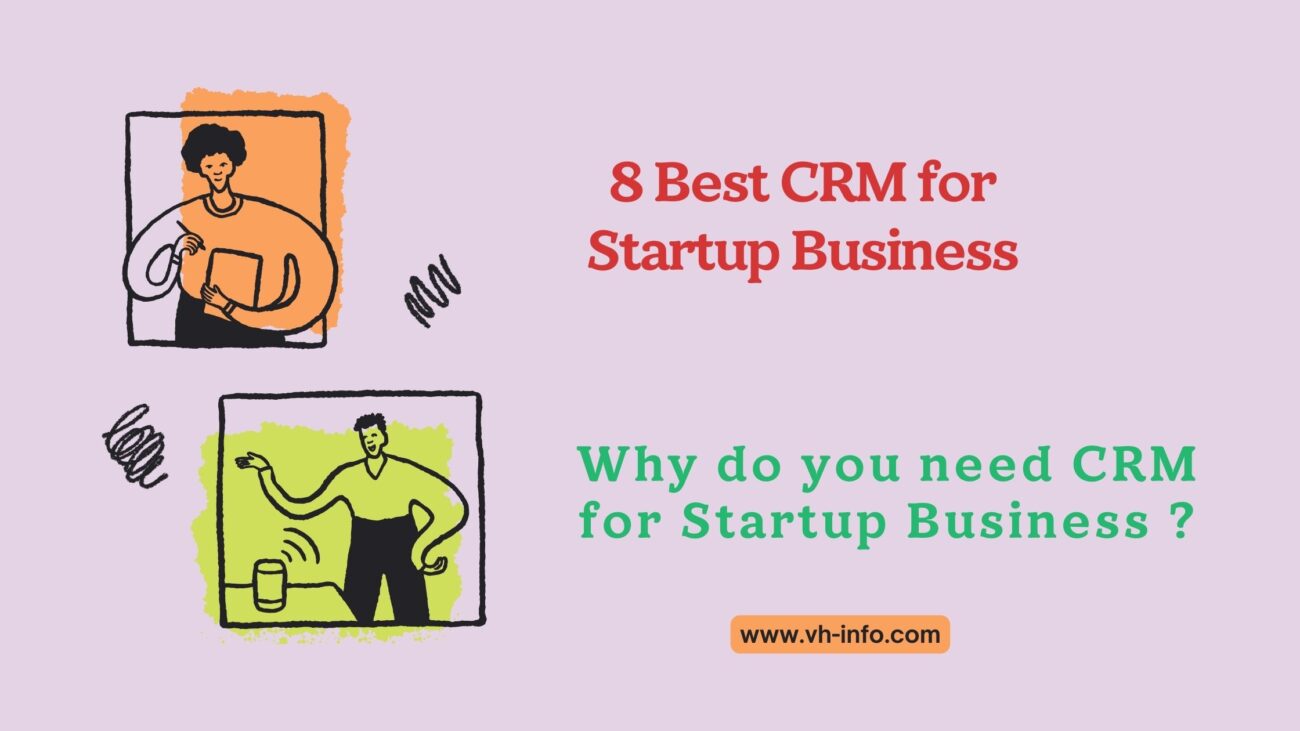 Why do you need CRM for startup
Why do you need CRM for startup
- Organize customer data and streamline workflows
- Improve sales pipeline management and close more deals
- Build stronger customer relationships that drive loyalty
- Make data-driven decisions for future growth
By investing in a CRM, startups gain a powerful tool offered by Dynamic CRM Consultants to compete effectively, build lasting customer relationships, and make smarter decisions based on data.
#8 Best CRM for Startup Business
#1 HubSpot CRM
HubSpot CRM is a customer relationship management (CRM) platform designed to be easy to use and accessible to businesses of all sizes. Unlike traditional CRMs that can be complex and expensive, HubSpot CRM offers a free tier with core features like contact management, lead capture, and deal tracking.
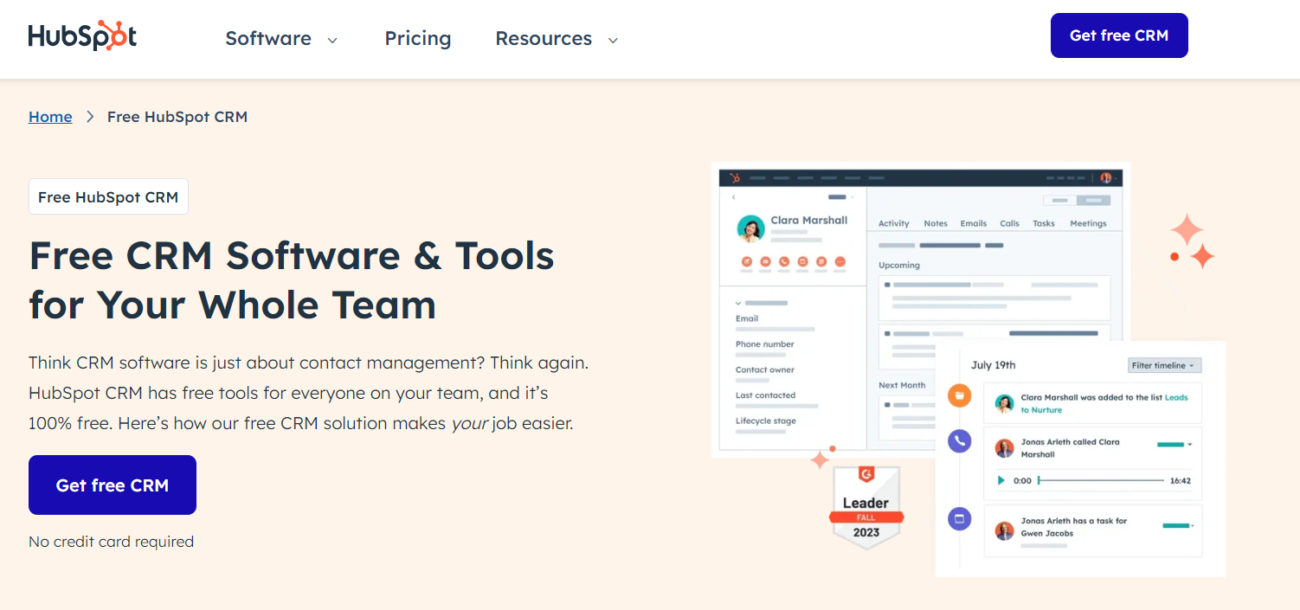 HubSpot CRM
HubSpot CRM
Feature
- Sales Automation
- Email Management (Lead Capture)
- Pipeline Management
- Customer Service
- Integration
- Reporting Dashboard & Analytics
Pricing for Startups
- Use free tools upto 5 Users with Limited Features
- Starter Customer Platform – $20/month/seat
- Professional Customer Platform – $1200/month/5 user with all feature
#2 Zendesk CRM
Zendesk doesn’t offer a traditional CRM product on its own, but its customer service platform Zendesk Sell acts as a CRM solution with features designed to improve your sales pipeline and team productivity.
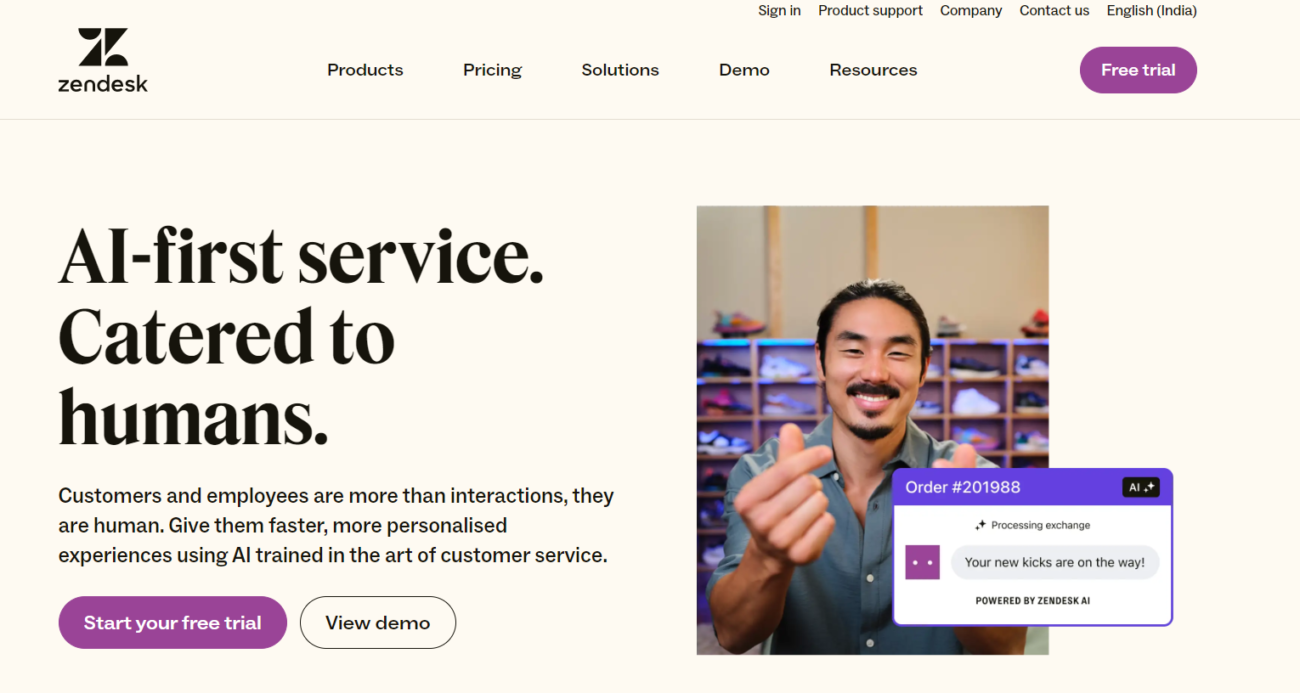 Zendesk CRM
Zendesk CRM
Feature
- Contact & Lead Management
- Sales & Pipeline Management
- Email Automation
- Sales tracking & collaboration
- Integration
- Live Chat
Pricing
- Free Trial Available
- Basic Plan starts from $19 / month
- Suite Team : $55 Per User / Month
- Suite Growth Team : $89 Per User / Month
- Suite Professional : $115 Per User / Month
- Contact to sales for Enterprise Plan
#3 Streak CRM
Streak isn’t a standalone software, but rather a Gmail add-on that transforms your inbox into a CRM system. This makes it ideal for users who are already comfortable working within Gmail and want a CRM solution that integrates seamlessly with their email workflow. If you’re looking for a streak alternative, there are several other options that might better suit your needs.
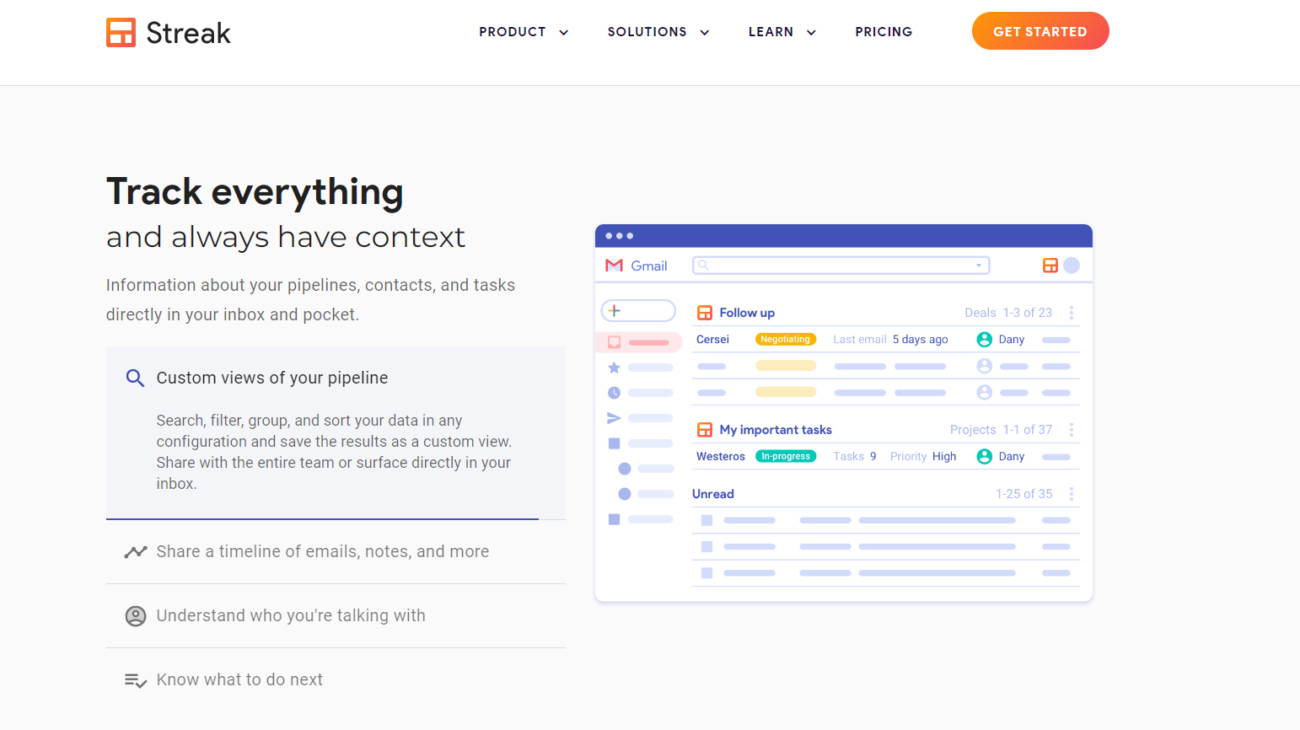 Streak CRM
Streak CRM
Feature
- Task Management
- Email tracking & Automation & Templates
- Customization & Collaboration
- Social Media Integration
Pricing
- Pro Plan : $59 / Per user / per month
- Pro + Plan : $89 / Per User / Per Month
- Enterprise Plan : $159 / Per user / Per month
#4 Agile CRM
Agile CRM positions itself as an all-in-one CRM designed specifically for the needs of small and medium-sized businesses (SMBs). It offers a comprehensive suite of features for sales, marketing, and customer service, all within a single platform.
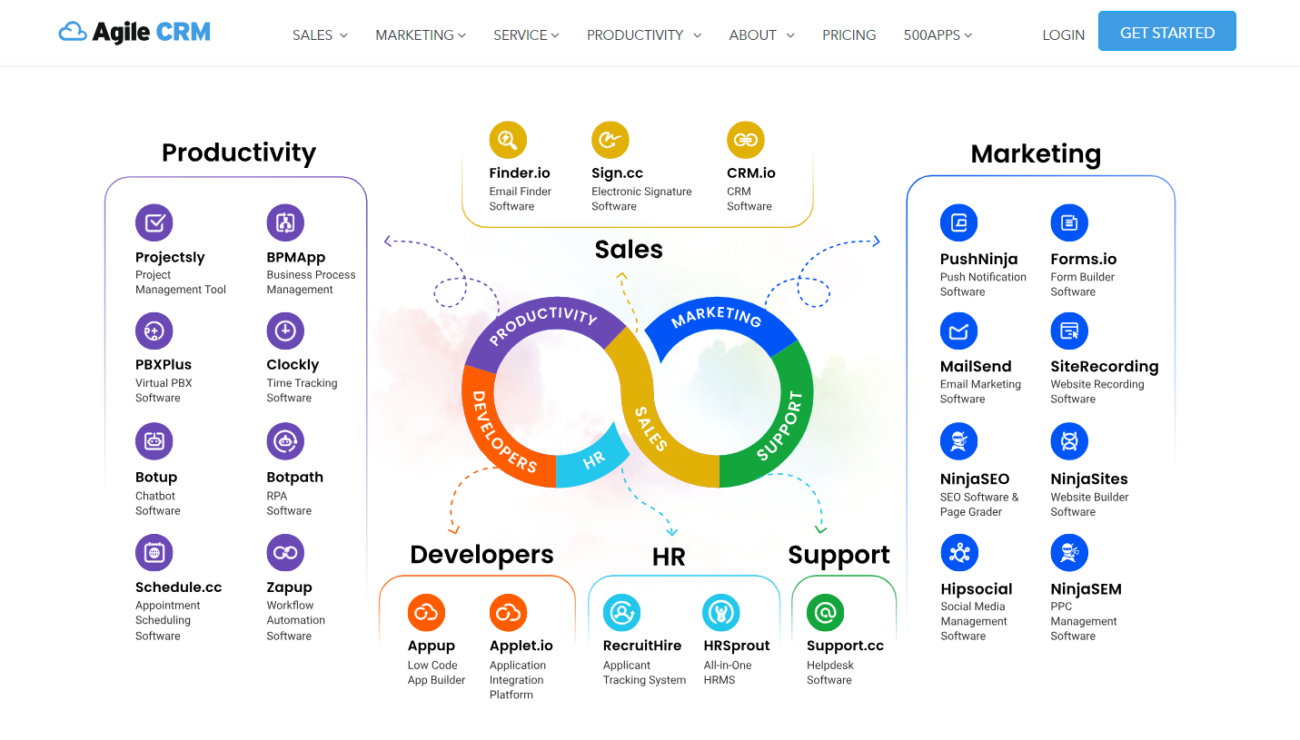 Agile CRM
Agile CRM
Feature
- Real Time Chat
- Performance Tracking
- Contact Management
- Sales Automation
- Telephone Integration
- Reporting and Analytics
Pricing
- Free up to 10 users
- Starter Plan : $15 / month / per user
- Regular Plan : $50 / month / per user
- Enterprise Plan : $80 / month / per user
#5 Sugar CRM
Sugar CRM is a customer relationship management (CRM) platform known for its flexibility and customizability. It caters to businesses of all sizes, from startups to large enterprises, offering a variety of deployment options (cloud-based or on-premises) and feature sets to suit specific needs.
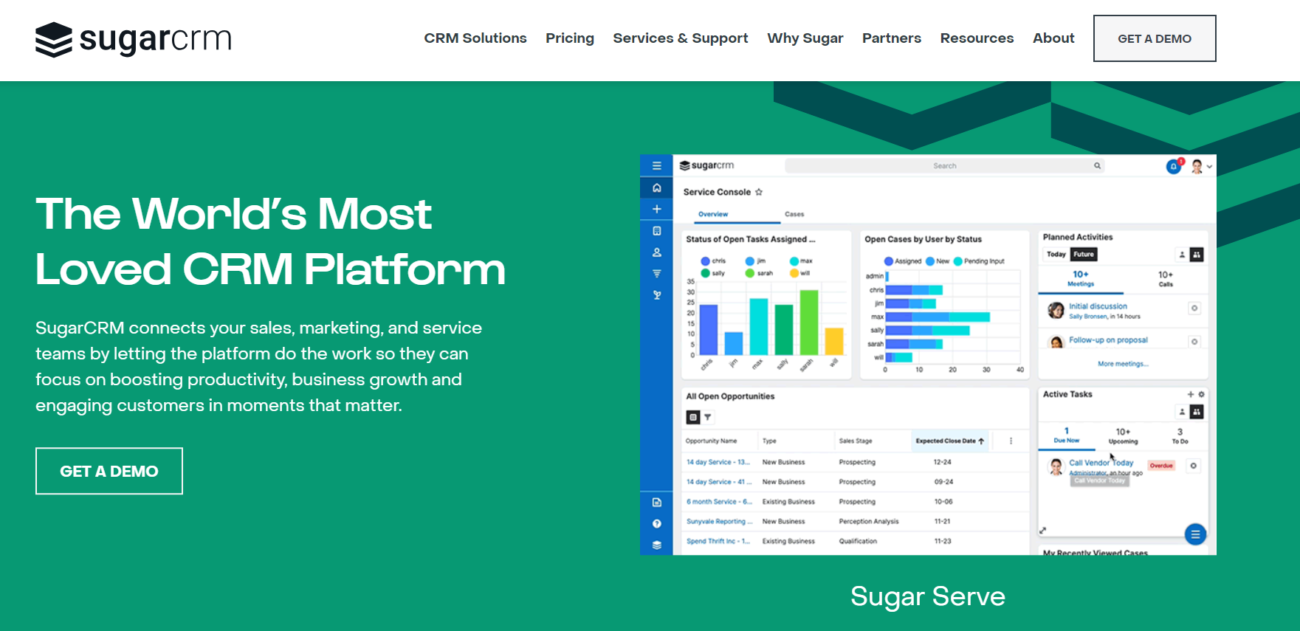 Sugar CRM
Sugar CRM
Feature
- Multiple Scoring Model
- Source Tracking
- Sales & Workflow Automation
- Mobile CRM
- Dashboard & Reporting
- Integration
- Mobile CRM
Pricing
- Essentials Plan : $19 / per user / month (minimum 3 user & Maximum 5 user )
- Advanced Plan : $85 / Per User / month (minimum 3 user)
- Premier Plan : $135 / per user / month (minimum 10 user)
#6 NetHunt CRM
NetHunt CRM is a Google CRM that natively integrates with Google Workspace applications that most startups already use and love. The solution has won the hearts of thousands of users with its simplicity, which doesn’t compromise on robust functionality and ultra-customizability, allowing the tool to scale as your business grows.
With NetHunt’s native Gmail integration, you can manage customer interactions, track sales, and automate tasks right where you already work — forget about switching tabs or entering data manually into customer records.

Feature
- Native Google Workspace integration
- Automatic lead capture from various sources (websites, calls, social media, emails)
- Built-in email marketing (bulk campaigns, ultracustomizable templates, drip sequences)
- Sales pipeline automation
- Multiple integrations (messengers, social media channels, Google Workspace, and VoIP services)
- Multi-channel lead nurturing
- Actionable sales reporting
Pricing
Offers a 14-day free trial with no credit card required (free trial is available for all plans)
- Basic. Core CRM functions at $24 per user/month, billed annually.
- Basic Plus. Includes Basic features and mass email campaigns at $34 per user/month, billed annually.
- Business. Ideal for businesses with diverse lead generation channels at $48 per user/month, billed annually.
- Business Plus. Advanced features for larger companies at $68 per user/month, billed annually.
- Advanced. Comprehensive CRM features at $96 per user/month, billed annually.
NetHunt also offers a two-year long program for startups with comprehensive assistance. Startups that are 3 years old or younger may apply for the program.
#7 Pipedrive CRM
Pipedrive is a sales-focused CRM platform designed to simplify and visualize your sales pipeline. It caters primarily to small and mid-sized businesses (SMBs) with a user-friendly interface and features that streamline the sales process.
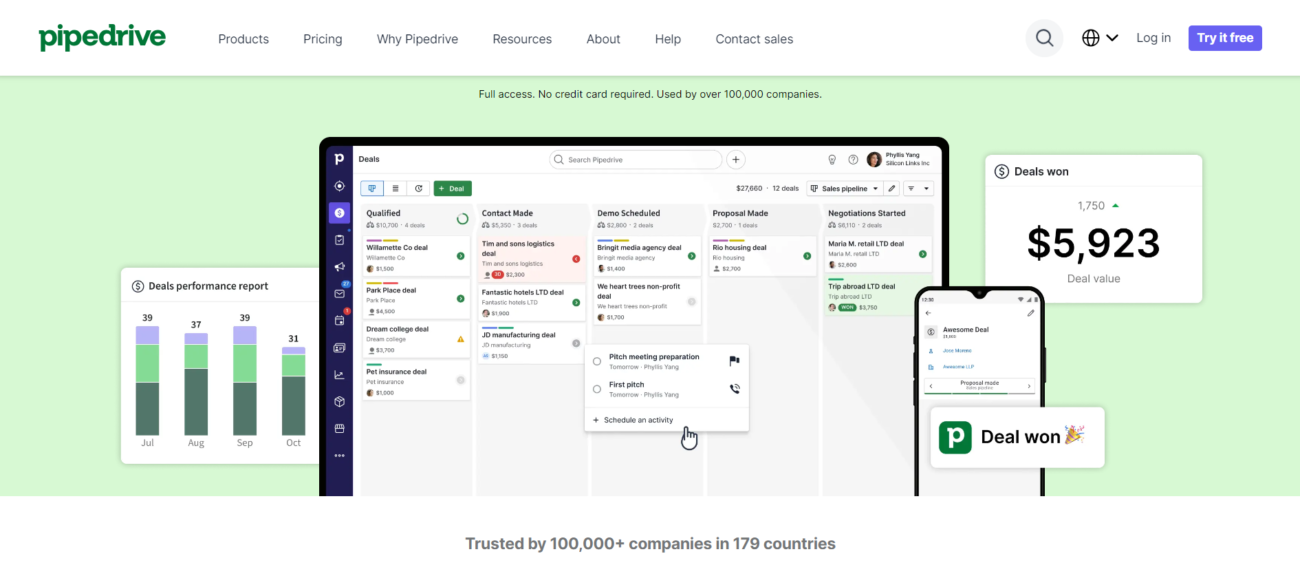 Pipedrive CRM
Pipedrive CRM
Feature
- Analytics Dashboard
- Tracking & Reporting
- Lead Management
- Customer Segmentation
- Performance Metrics
Pricing
- Essential Plan : $14 / month / per user
- Advanced Plan : $29 / month / per user
- Professional Plan : $59 / month / per user
- Power Plan : $69 / month / per user
- Enterprise Plan : $99 / month / per user
#8 Salesforce CRM
Salesforce CRM is a cloud-based CRM platform designed to manage all your customer interactions and relationships in one place. It offers a comprehensive suite of features catering to various departments like sales, marketing, customer service, and IT. Due to its extensive functionalities and scalability, Salesforce is a popular choice for businesses of all sizes, from startups to large enterprises.
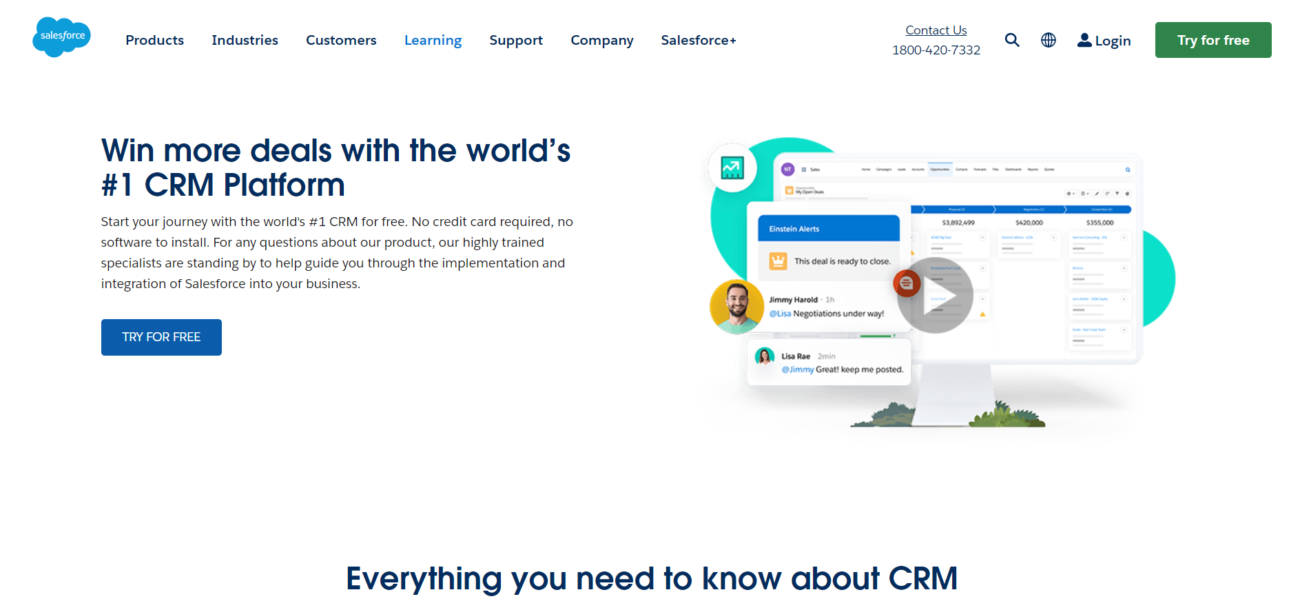 Sales force CRM
Sales force CRM
Feature
- Pipeline Management
- Social Media Integration
- Task Management
- Marketing Automation
- Security & Reliability
- Mobile App
- Customization and Scalability
Pricing
- Starter Suite : $25 / user / month
- Pro Suite : $100 / user / month
#9 Monday.com CRM
Monday.com CRM offers a unique approach to customer relationship management (CRM), focusing on simplicity, flexibility, and visual organization. Unlike traditional CRMs that can be complex and rigid, product management Monday CRM leverages their popular work operating system to create a CRM solution that is easy to use and highly customizable.
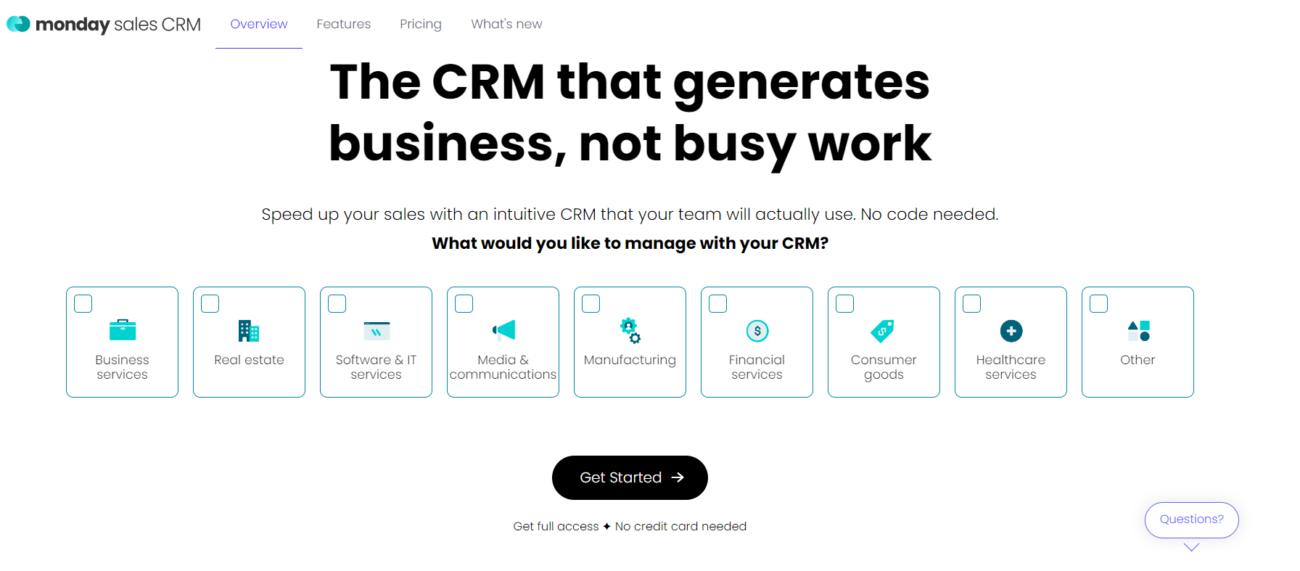 Monday Sales-CRM
Monday Sales-CRM
Feature
- Customizable sales pipeline
- Kanban board view
- Reporting and Analytics
- Affordable & Easy to use
Pricing
- Basic CRM Plan : $12 / per user / month
- Standard CRM Plan : $17 / per user / month
- Pro CRM Plan : $28 / per user / month
- Enterprise Plan : Contact to sales
#10 Softr
Softr is a no-code platform that lets startups build custom CRMs quickly — without developers. Instead of forcing you into rigid pipelines or fixed workflows, Softr gives drag-and-drop building blocks, flexible data sources, and the ability to add only what you need now.
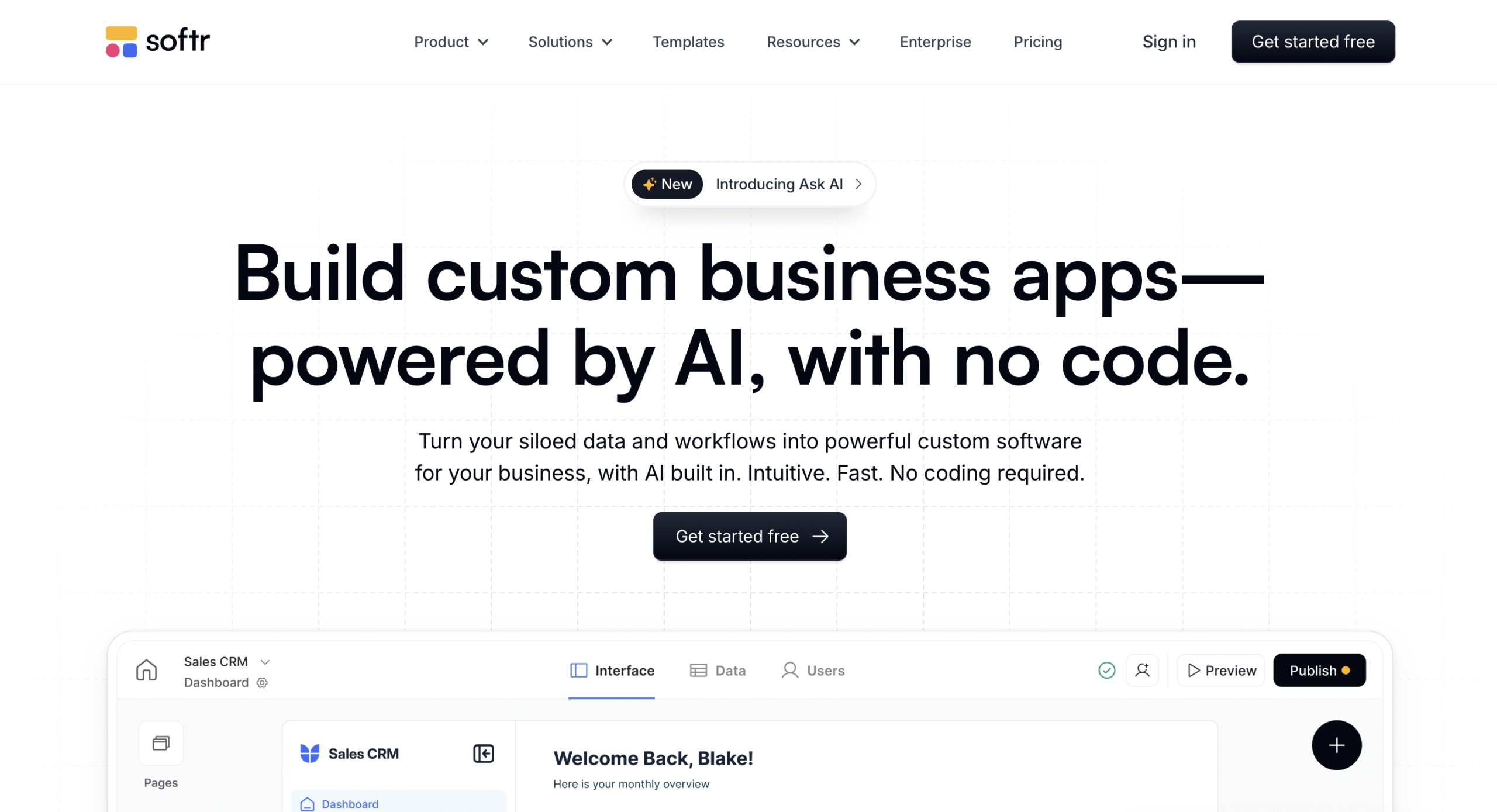
Feature
- Lead tracking via web forms and integrations with tools like Airtable, Google Sheets, Notion, or SQL databases. Using a Postgres GUI can further enhance this process by allowing teams to visually manage and analyze captured leads directly within their PostgreSQL database for faster insights and decision-making.
- Contact & account management, including interaction history, deal stages, document and invoice tracking.
- Custom dashboards & reporting with real-time data sources.
- Permissions & user roles so different team members see only what’s relevant.
- Automation & workflows via integrations (Zapier, etc.) plus the ability to build portals (client/vendor/employee) and even mobile-friendly apps.
Pricing:
- Free: $0/mo – 1 published app, up to 10 app users, 2 user groups, basic features & standard data sources.
- Basic: ~$49/mo – 3 apps, ~20 users, custom domains, basic custom code/embed/email sender, more standard data sources.
- Professional: ~$139/mo – unlimited apps, around 100 users, more user groups, richer integrations, remove branding, advanced actions (APIs, conditional forms etc.).
- Business: ~$269/mo – built for scale: higher user limits (2,500), unlimited apps and user groups, advanced data sources, domain-restricted signups, global data/security controls.
- Enterprise: Custom pricing – tailored for large orgs, includes added security (SSO etc.), dedicated onboarding/support/training, custom user & data limits.
Conclusion – Why Every Startup Needs a CRM
According to vh-info In the huge competition of startup, customer relationships are paramount. A CRM (Customer Relationship Management) system isn’t just a nice-to-have for established businesses but it is a powerful tool that can empower your startup to thrive.
Investing in a CRM is an investment in the future of your startup. By streamlining operations, strengthening customer relationships, and providing valuable data insights, a CRM can be a game-changer for any startup looking to gain a competitive edge and achieve long-term success.
